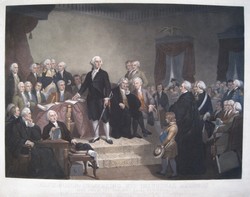George Washington And John Adams
|
| updated |
Copy Link Code
|
 John Adams and George Washington played very different roles in the War of Independence and early years of the United States, but both of them were indispensable to the cause of American liberty. Adams had always been known as a great judge of character and for John Adams, George Washington was obviously the man to lead the Continental Army. During the First Continental Congress of 1775, Adams nominated Washington to lead the colonial army before it was even known that they would indeed rebel. The decision proved wise even after Washington's early losses brought criticism on his leadership. Whereas George Washington was the premier soldier and general of the Continental Army, John Adams was the premier diplomat representing America in Europe. When Washington was victorious at Yorktown in 1781, it pushed Adams to success at the negotiating table and he had soon secured peace with the British on strong terms through the Treaty of Paris in 1783. Before the end of the war, Adams had become somewhat critical of Washington's status as an idol among the populace. This feeling of envy would remain and grow over the course of their political career together.
John Adams and George Washington played very different roles in the War of Independence and early years of the United States, but both of them were indispensable to the cause of American liberty. Adams had always been known as a great judge of character and for John Adams, George Washington was obviously the man to lead the Continental Army. During the First Continental Congress of 1775, Adams nominated Washington to lead the colonial army before it was even known that they would indeed rebel. The decision proved wise even after Washington's early losses brought criticism on his leadership. Whereas George Washington was the premier soldier and general of the Continental Army, John Adams was the premier diplomat representing America in Europe. When Washington was victorious at Yorktown in 1781, it pushed Adams to success at the negotiating table and he had soon secured peace with the British on strong terms through the Treaty of Paris in 1783. Before the end of the war, Adams had become somewhat critical of Washington's status as an idol among the populace. This feeling of envy would remain and grow over the course of their political career together.
After the ratification of the U.S. Constitution, George Washington and John Adams were elected President and Vice President, respectively. While Washington was hesitant to take a leading role in politics after his leading role in the military, Adams was embarrassed by his low electoral results and despised his position as Vice President. Adams thought little of the role he held under Washington's administration, but he did manage to make an impact. John Adams made 29 tie-breaking votes in the Senate, a record that stands to this day. For George Washington, John Adams was an annoying and loudly opinionated politician and thus he did not confer much with his Vice President, a legacy many Presidents seem to follow. Adams was able to secure himself nomination as the Federalist candidate in the election of 1796 in which he narrowly defeated Thomas Jefferson. The relationship between Washington and Adams, however, was not over.
In 1798, France and the United States came very close to open conflict. The French Navy had been harassing American merchant vessels as they were heading towards Britain and the Adams administration had to do something to defend American interests. When it seemed that the Quasi-War (as it came to be known) could spill over onto land, Adams called up an army and once-again nominated George Washington to take command. Washington, however, had not offered to lead and preferred to put his young protégé Alexander Hamilton in charge. Hamilton and Adams had long been fierce political rivals despite their shared Federalist affiliation; President Adams was furious at the appointment of Hamilton to Chief-of-Staff and effectively, commander of the army. Although he secured peace with France before the conflict spread, Adams was spiteful of Washington's maneuvering and the two would never have a chance to resolve their differences as Washington passed away only one year later.
